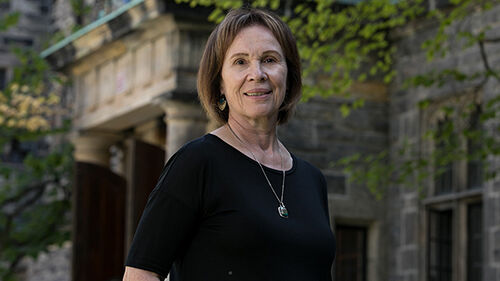In 1987, Marsha Hewitt was the first woman, full-time tenure track professor ever hired in the Faculty of Divinity. Over the years, she has taught students not only in the Faculty of Divinity, but also in Trinity’s Ethics, Society & the Law Program, where she was the program director (1995-1998 and 2002-2005). Marsha was the director of the former Psychoanalytic Thought Programme at Trinity College (1998-1999). She has been teaching graduate and undergraduate students in the Department for the Study of Religion in the University of Toronto since 1990. For the past year, Marsha has been Acting Dean in the Faculty of Divinity, the first woman to ever hold this position at Trinity College.
1. Marsha, congratulations on being Trinity’s first female Dean of Divinity! What does it mean to you to be the first woman in the role?
MH: There is always something deeply sobering about being the ‘first’ any person to hold such an important administrative office. Trinity College is a very different place in many significant ways than when I first came here, and even more so with recent initiatives to ensure the College is a safe and welcoming place for everyone. Although I faced some challenges during my early years in the Faculty, I have grown, academically and professionally. At Trinity College and the University of Toronto I have had the great privilege of doing what I love most in the world, alongside being a mother: teach. Professionally, this is what matters most to me. I rarely think about my being the first woman Dean or tenured professor in the Faculty of Divinity. Rather, my focus is on the work, not only getting the job done, but doing it in the best possible way. This has always been and remains my main goal in my professional life.
2. Can you share what you’ve learned the most in your role as Acting Dean?
MH: I have learned a great deal in a very short time. I have been challenged in new ways and have been faced with situations and problems to solve I have not encountered before and would not in the normal course of being an academic. It’s been an important experience for me, and it will remain so until June 30.
3. What is the very best part of being Dean of Divinity?
MH: The best part of being the Dean this year is that I got to know some of my colleagues and many of our students much better. Also, I have found that every person I have reached out to for advice or support, whether in the college administration, or in the Anglican Church, has been gracious and generous in their responses. My colleagues in the Faculty have been supportive of my work while in the role of Dean, especially with respect to the accreditation visit by the Association of Theological Schools last fall. That was an intense experience, to say the least. Everyone pulled together during that time, and I am proud that we made a very fine account of the Faculty and its work. It has been an unusually challenging year to take up the role of Acting Dean, with the ATS visit to navigate, the launch of our “Reimagining Contemporary Ministries” initiative that was made possible by a substantial grant from the Lilly Endowment Inc., and efforts to rebuild our in-person academic and worship community following two years of remote delivery due to the pandemic – but we are in good shape for the next academic year.
4. What are you most excited about for the future of the Faculty?
MH: The Faculty of Divinity, like Trinity College of which we are a part, shares a commitment to values that embrace human beings in all their difference and diversity. We are facing important challenges to our teaching, our role in the formation not only of clergy in the Anglican Church, but in the formation of students interested in applying their knowledge and expertise in making the world a better place.
The Faculty of Divinity is engaged in changes and refinements to its curriculum that are committed to contributing to a relevant, living Anglican Christianity that assumes the inherent and equal value and dignity of every human being, regardless of their ethnicity, race, sexuality or gender. A part of the “Reimagining Contemporary Ministries” initiative involves rethinking and making changes to our curriculum and Field Education programme. We have made a great deal of progress in these areas. I am pleased about the work we have accomplished this year and about what we will be able to accomplish over the remaining four years of the initiative. The Faculty of Divinity can play an important role in moral and spiritual leadership in a world where violence, racism and every other imaginable form of injustice seem to be escalating.
We are actively working to engage with various communities in Toronto and beyond, including Indigenous communities. We want people to know – be they Anglicans, Christians from different denominational backgrounds or anyone interested in pursuing theological education, whatever their motivation – that they are welcome here. These normative commitments will continue to inform and shape our teaching.
5. What’s the one thing you’d like people to know about Divinity at Trinity today?
MH: A student who is applying to one of our programmes said to me quite recently that when he was living in his faraway country, he heard about theological studies at Trinity College and dreamed of coming here to study at “one of the finest theological colleges in the world.” He was so happy at the prospect of coming here (we accepted him!), and grateful for the opportunity. It made my day.
BONUS: What are you going to do for fun this summer?
MH: Ha! Fun? I will finally get to write the book I have been trying to write for the last couple of years! The research is done, I am quite excited to get to work on it. And, spend some time at a cottage we rent on the shores of Lake Huron, at Sauble Beach. Walking on the shore of that beach is a wonderful experience.

